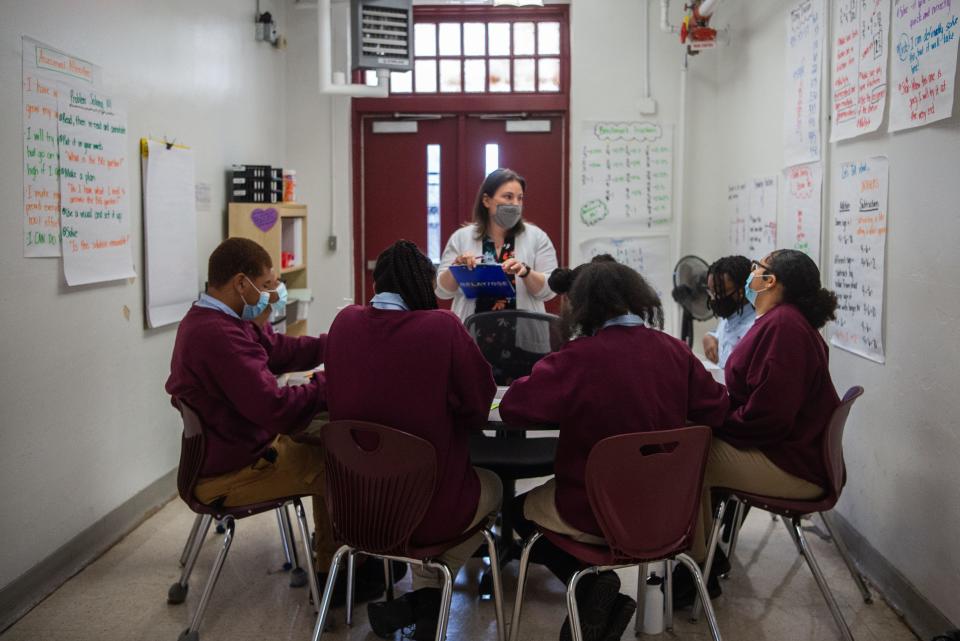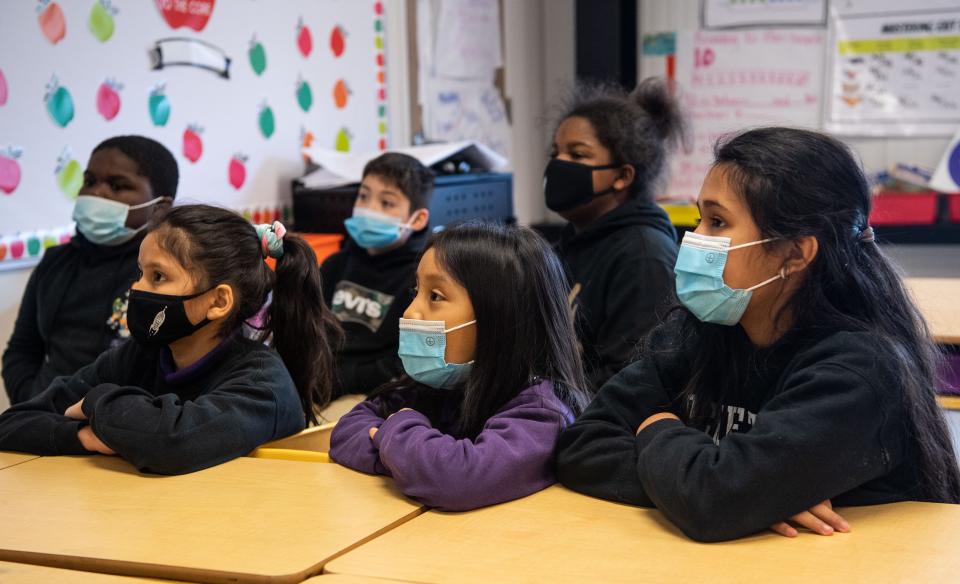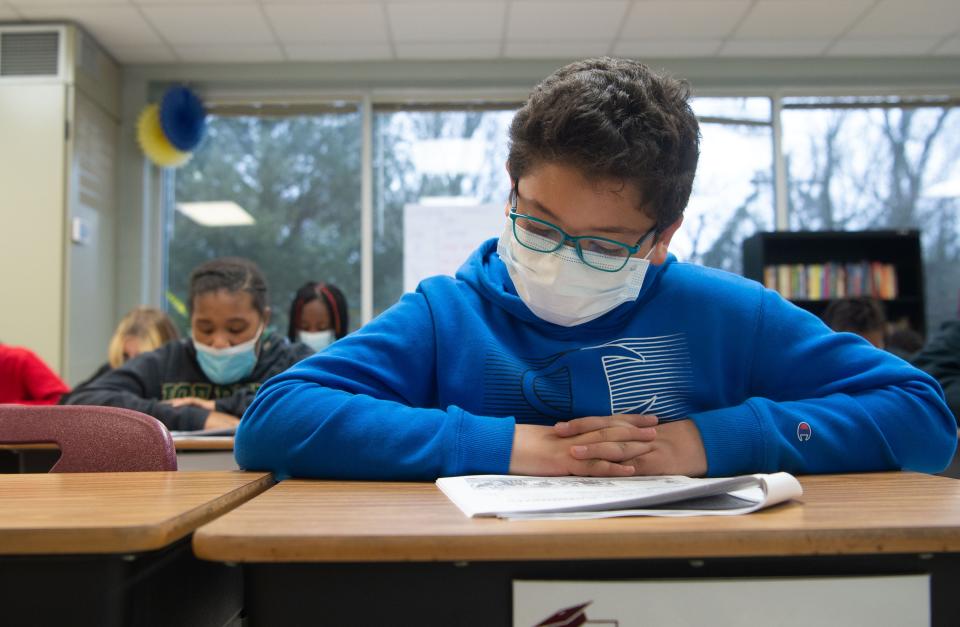Just Askin': How do Nashville charter schools perform compared to other public schools?
Just Askin' is a Tennessean initiative which answers your burning questions about Nashville and Middle Tennessee. Created by our nosy newsroom of Nashville reporters. Email us at justaskin@tennessean.com and your question could appear in an upcoming column.
Charter schools have been part of Tennessee's public school system since 2003, when one opened in Nashville and three in Memphis. Since then, the number of charter schools has climbed statewide to nearly 114.
The state's charter schools are mostly concentrated it its largest school districts, including Hamilton County Schools, Knox County Schools, Metro Nashville Public Schools and Memphis-Shelby County Schools. During the 2021-22 school year, they accounted for just under 44,000 student enrollments.
So how do charters stack up against their district peers, and what should parents consider as they choose a school for their kids? That leads us to one of our reader-submitted questions.
Question: How do we tell if Nashville charter schools are successful at giving students choices? Are they really better? Are students at these schools really achieving greater results and outdoing their peers at the public schools? How do we know and what do they do different to achieve those gains?
Answer: Before we dive into how Nashville charter schools compare to their public school counterparts, here are a few key things to understand.
You got questions. We got answers.
Click to email us at justaskin@tennessean.com, and your question could appear in an upcoming column.
What are charter schools and who sets their standards?
Charter schools are public, meaning they are taxpayer-funded and free to attend. They are also held to the same standards as public schools, like standardized testing. However, they are privately run by nonprofit governing bodies that are required to include parents.
In Nashville, charters are subject to the MNPS Board of Education, which is tasked with monitoring the academic and financial performance of all charters. The board can also approve or deny charter applications and renewals.
"Although they must meet all state standards and requirements just like district schools, Tennessee’s public charter schools are allowed flexibility to choose their own curriculum, educators, schedules, extracurricular activities and more," Emma McWeeney, who serves as the director of charter initiatives for nonpartisan nonprofit TN SCORE, told The Tennessean.
Learn more about how charter schools function in Tennessee at www.tn.gov/education/families/school-options/charter-schools.

Who can attend charter schools?
Any student who lives in the district governing a charter school can attend. Charters are required to enroll students if they submit applications on time and space permits, according to the state education department, regardless of their academic, behavior or special needs. If demand surpasses the available spots, the charter school uses a random lottery to enroll students.
Charter authorities can also sometimes enroll students outside their local district, so long as they adhere to an out-of-district enrollment policy.
How many charter schools are there in Nashville?
MNPS oversees 30 charter schools, including one that is part of the state's Achievement School District.
The Achievement School District is a statewide network of schools ranging from Pre-K to 12th grade. The schools included are listed as "priority schools," meaning they are in the bottom 5% of performance statewide. The district currently operates charter schools in Shelby and Davidson counties.
An additional nine Nashville charter schools are part of the Tennessee Public Charter School Commission, which can authorize charter schools that are not approved by the local school district. Those include: KIPP Antioch College Prep Elementary, KIPP Antioch College Prep Middle, Nashville Collegiate Prep, Rocketship Dream Community Prep, KIPP Antioch Global High School, KIPP Southeast Nashville College Prep Elementary School, KIPP Southeast Nashville College Prep Middle School, Tennessee Nature Academy and LEAD Neely's Bend.
Find a full list of MNPS zoned charter schools, along with links to each school’s website, at mnps.org/learn/schools.
A big-picture look at how Nashville charter schools compare to district, state peers
Alright. Now that we've got all that established, let's compare some numbers. An important thing to keep in mind: These numbers are not the whole picture. (We'll get into that more below.)
The Tennessee Department of Education releases an annual report card, typically near the end of each year. The most recent report card was released in November, reflecting the 2021-22 school year.
Let's take a look at success rates, which refer to the percentage of students who met or exceeded expectations in math and English language arts, measured by the state's standardized test. We'll also take a look at achievement scores, which range from 0-4 and also measure student performance on English language arts and math.

"A higher score means higher performance by having higher success rates relative to others in the state or demonstrating significant growth relative to prior performance," the Tennessee Department of Education website states.
The state's report card breaks down success rates and achievement scores separately for grades 3-5, 6-8 and 9-12. An average of those three numbers for MNPS comes out to a 23% success rate and an achievement score of 3.3.
Out of Nashville's 30 public charter schools, 12 perform at or above the average success rate across all grades for MNPS schools. Another charter school falls just shy of that mark with a 22.8% overall success rate.
For comparison, the state's overall success rate sits at 33.8% — a mark five of Nashville's charter schools surpass. A sixth charter school is just below that rate at 32.3%.
Here's the full list of success rates, along with achievement scores, for each of the district's charter schools. The list is ranked from highest to lowest overall success rate.
Valor Voyager Academy: 59.4% overall success rate / 4.0 achievement score
Valor Flagship Academy: 57.1% overall success rate / 3.9 achievement score
Purpose Prep: 53.1% overall success rate / 4.0 achievement score
Nashville Classical: 49.7% overall success rate / 4.0 achievement score
KIPP Antioch College Prep: 45.4% overall success rate / No data available for achievement score
Liberty Collegiate Academy: 32.3% overall success rate / 3.8 achievement score
Smithson Craighead Academy: 28.4% overall success rate / 3.6 achievement score
East End Prep: 27% overall success rate / 3.5 achievement score
Nashville Prep: 27% overall success rate / 3.9 achievement score
Rocketship United Academy: 26.3% overall success rate / 3.7 achievement score
Explore Community School: 24.3% overall success rate / 3.2 achievement score
KIPP Nashville College Prep (middle school): 24.1% overall success rate / 3.7 achievement score
KIPP Academy Nashville (middle school): 22.8% overall success rate / 3.6 achievement score
KIPP Nashville College Prep Elementary School: 21.0% overall success rate / 3.0 achievement score
STEM Prep Academy: 20% overall success rate / 2.7 achievement score
Strive Collegiate Academy: 19.9% overall success rate / 2.9 achievement score
STEM Prep High School: 19.7% overall success rate / 1.0 achievement score
KIPP Nashville Collegiate High School: 18.7% overall success rate / 2.0 achievement score
LEAD Southeast: 18.7% overall success rate / 2.0 achievement score
Intrepid Prep: 17.7% overall success rate / 2.8 achievement score
RePublic High School: 16.7% overall success rate / 1.8 achievement score
Rocketship Nashville Northeast Elementary: 16.1% overall success rate / 3.0 achievement score
Knowledge Academies at The Crossings: 12.6% overall success rate / 1.9 achievement score
LEAD Cameron College Preparatory: 11.9% overall success rate / 1.9 achievement score
KIPP Kirkpatrick Elementary: 11.1% overall success rate / 2.0 achievement score
**LEAD Neely's Bend (Neely's Bend College Prep): 10.3% overall success rate / 1.2 achievement score
LEAD Academy High School: 9.8% overall success rate / 1.0 achievement score
Knowledge Academies (high school): 9.5% overall success rate / 0.6 achievement score
*Brick Church College Prep Charter: 5.7% overall success rate / 1.1 achievement score
*Denotes Achievement School District
**Denotes Tennessee Public Charter Commission
No data was yet available for Aventura Community School since the school opened in fall 2022. Complete state data is not available on the remaining eight Tennessee Public Charter School Commission schools because they were recently opened or will open soon.
Explore the latest state report card for yourself at reportcard.tnedu.gov.
Why those numbers don't tell the whole story
At first glance, the data seems cut-and-dry. But simply comparing each school's report card to the district and state average falls short of a more precise picture, according to the State Collaborative for Reforming Education, also known as TN SCORE.
TN SCORE is a nonprofit, nonpartisan and independent research institution. Its analysis of charter school performance looks at math and English language arts separately, to highlight any trends by subject. It also aggregates success rates based on enrollment size and other factors like the populations being served by a charter, compared to its district peers.
With all that in mind, TN SCORE found Nashville charter school students perform better compared to state and district peers, based on data for the 2021-22 school year.

McWeeney also said it's important to note that public charter schools are made up of roughly 80% students of color, versus 71% across traditional MNPS schools. However, both have similar demographics for economically disadvantaged students, students with disabilities and English learners.
"Students of color and economically disadvantaged students at Nashville charters outperformed their state and district peers across subjects — on average, with proficiency rates 10 points above their district peers at traditional public schools," McWeeney said.
McWeeney also said about 80% of Nashville charters scored in the highest level for student academic growth based on the Tennessee Value-Added Assessment System. Additionally, 15 of Nashville's charter schools were ranked as reward schools, which is the top academic distinction in the state. Reward status factors in overall student academic achievement and student growth. A total of 48 schools across MNPS are reward schools, including the charters, based on the latest state data.
So what makes charter schools successful? That may partially be due to the flexibility charters have when it comes to curriculum, educators, schedules and extracurricular activities, according to McWeeney.
"While traditional district-run schools can go through processes to have more flexibility, charter schools can do so more nimbly," she said. "All these flexibilities allow charter schools to design innovative school models that uniquely meet students' needs."
What to consider when choosing a school for your child
Varying academic performance is typical across all types of schools, including traditional public schools. While academics are an important factor, here are a few other things to keep in mind as you look for the right fit for your child.
School size
Student-to-teacher ratios
Class sizes
School culture
Athletics and extracurriculars
Location
Demographics
Teaching methods
Charter schools may not be for everyone. While innovative or nontraditional teaching approaches may suit some, critics of charter schools point to inconsistent methods and results across charters as a whole. Some argue funding dedicated to charters could be better used to support existing traditional public schools. Since charters have limited space, they also may have long waitlists for new students.
Schools typically offer visits and information sessions for parents and prospective students. You can find out more by contacting the school directly.
The Scarlett Family Foundation, an nonprofit education grant maker, offers a helpful guide to the different kinds of schools in Nashville at scarlettfoundation.org/friends-followers/nashville-education-facts.
This article originally appeared on Nashville Tennessean: How do Nashville charter schools perform?

